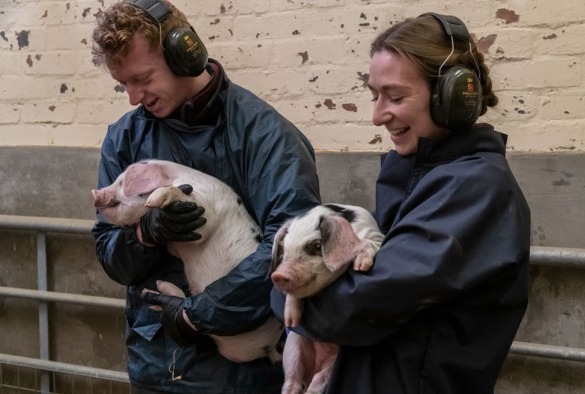The University of Liverpool is to team up with cutting-edge businesses to boost the Cheshire Science Corridor’s growing reputation as a world leading cluster in human and animal life sciences.
With a focus on life sciences, net zero, nuclear and high value manufacturing and home to world class assets ranging from AstraZeneca’s Hurdsfield manufacturing plant to Alderley Park – the UK’s largest single site life sciences campus, the Cheshire Science Corridor is made up of 1,300 advanced manufacturing businesses and around 160 life science companies – stretching 40 miles along the M56 from Capenhurst to Macclesfield.
Earlier this year Chester Zoo joined the Corridor forging relationships with public and private sector partners who are using the combined strengths in human and animal life sciences to enhance cutting edge research in areas ranging from conservation to zoonotic diseases that can cross over into human populations.
Now its burgeoning reputation as a base for world-leading science, technology and collaborative research has been boosted further with confirmation the University of Liverpool was now officially on board.
University officials said joining the Cheshire Science Corridor would allow it to work with businesses and enhance the pioneering animal life sciences work based at its Leahurst Campus in Neston, Cheshire.
As well as at its Liverpool and Leahurst campuses, the University also operates at sites such as Sci-Tech Daresbury and is keen to use its membership of the Cheshire Science Corridor to link research expertise across the region and work with its partners.
Collaborations already underway include the university, Cheshire and Warrington Local Enterprise Partnership (LEP) and Chester Zoo utilising their collective expertise to create a regional cluster in Animal Health Sciences.
The university is the latest academic institution to join the Cheshire Science Corridor.
Professor Matthew Baylis, Executive Dean of the Institute of Infection, Veterinary and Ecological Sciences at the University of Liverpool said: “We’re delighted to have joined the Cheshire Science Corridor and our inclusion is testament to the contribution we make to the health and life sciences sector in the county.
“The University of Liverpool’s aim is to educate well-rounded, enquiring global citizens who connect and engage with the grand challenges of the age.
“The School of Veterinary Sciences boasts world class academics, clinical facilities and research that enrich the learning environment.
“Being part of this partnership gives us the opportunity to increase impact with partners and businesses and further enhance the work we do and our vision for the Leahurst site.”
The university’s Leahurst campus is home to the School of Veterinary Science which has facilities for teaching up to 400 fourth and final year veterinary students.
It is also a research base for the Institute of Infection, Veterinary and Ecological Sciences (IVES) in areas such as zoonotic diseases that spread from animals to people, insect-borne diseases, food security, animal behaviour, antimicrobial resistance, farm animal health and welfare, and equine and small animal medicine.
Clare Hayward, Chair of Cheshire and Warrington LEP, said: “We are delighted a globally renowned institution and life science leader, the University of Liverpool has joined the Cheshire Science Corridor.
“The University of Liverpool are an important addition not only in terms of its cutting-edge research but its ability to engage with and support industry to innovate and strengthen our animal life sciences cluster, through its collaboration with Chester Zoo and the LEP. Bringing together our strengths in human and animal life sciences across the public and private sectors adds significant value to the region’s science and technology offering.”
